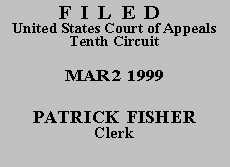

| AL PENN-WHITE,
Plaintiff-Appellant, v. TOM KING, in his official capacity as Superintendent of the Atoka Public Schools, Defendant-Appellee. |
|
Plaintiff-appellant Al Penn-White appeals from the district court's order granting summary judgment to defendant-appellee Tom King, in his official capacity as Superintendent of the Atoka Public Schools, on appellant's complaint alleging racial discrimination and retaliation in violation of 42 U.S.C. §§ 1981 and 2000e and the Civil Rights Act of 1991. We affirm.
We review the district court's grant of summary judgment de novo, applying the same standard as it applied. See McKnight v. Kimberly Clark Corp., 149 F.3d 1125, 1128 (10th Cir. 1998). This standard requires us to examine the record in order to determine whether any genuine issue of material fact was in dispute; if not, we determine whether the district court correctly applied the substantive law. See id. In doing so we examine the factual record and reasonable inferences therefrom in the light most favorable to the party opposing the motion. See id. Where the nonmovant will bear the burden of proof at trial on a dispositive issue, however, that party must go beyond the pleadings and designate specific facts so as to make a showing sufficient to establish the existence, as a triable issue, of an element essential to that party's case in order to survive summary judgment. See id.
The district court concluded, after a thorough and careful analysis of the evidence pursuant to the framework established by the Supreme Court in McDonnell Douglas Corp. v. Green, 411 U.S. 792, 802-04 (1973), that appellant had failed to carry his summary judgment burden on his claims of discrimination and retaliation. Having conducted a de novo review of the record, we agree. We therefore affirm for substantially the same reasons stated in the district court's order of summary judgment dated February 27, 1998.(1)
The judgment of the United States District Court for the Eastern District of Oklahoma is AFFIRMED.
Entered for the Court
Circuit Judge
*. This order and judgment is not binding precedent, except under the doctrines of law of the case, res judicata, and collateral estoppel. The court generally disfavors the citation of orders and judgments; nevertheless, an order and judgment may be cited under the terms and conditions of 10th Cir. R. 36.3.
1. The district court appears to have required appellant to present both evidence of pretext and direct evidence of discrimination. See Appellant's App. at 253-55. To survive summary judgment on the pretext issue, a plaintiff need not provide direct evidence that the employer was motivated by an illegal discriminatory animus. See Randle v. City of Aurora, 69 F.3d 441, 451-52 (10th Cir. 1995). He need only present evidence which creates a genuine issue of fact concerning whether a defendant's asserted reasons for an adverse employment actions are pretextual, i.e. unworthy of belief. See id. We affirm, nevertheless, because upon our reading of the record, appellant did not present sufficient evidence of pretext to survive summary judgment even under the proper standard.